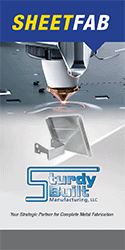 |
 |

|
|
|
Ohio Ag News Headlines |
 |
Antifreeze to Improve Airplanes, Ice Cream, Organ Transplants
Ohio Ag Connection - 08/17/2017
Taking inspiration from Antifreeze Proteins (AFPs) which occur in nature, researchers from the Department of Chemistry and Warwick Medical School have developed iron-based synthetic imitations, which have been shown to slow to growth of ice crystals.
The researchers suggest that these antifreeze properties are a result of the iron complex containing separated regions with water-loving and water-hating characteristics, which mimics the properties observed in AFPs.
AFPs exist naturally in a variety of animals that live in the most extreme environments on earth - such as Artic fish, which can use AFPs to stop their blood from freezing in sub-zero conditions.
The ability to prevent the growth of ice crystals could be of huge technological importance across a range of applications, from the protection of aeroplane wings and wind turbines from ice-damage, to making ice cream smoother or safely freezing human tissue
for transplantation.
"Some of these were found to be very potent at stopping ice growing, a rare property normally only associated with antifreeze proteins," explains lead researcher Professor Matthew Gibson.
"The versatile synthetic and adaptable nature of these compounds will let us fine-tune the structure to both understand the ice/water interface and develop new inhibitors for (bio)technological applications," he continues.
The research, 'Antifreeze Protein Mimetic Metallohelices with Potent Ice Recrystallization Inhibition Activity' is published in the Journal of the American Chemical Society.
It is co-authored by Professor Peter Scott and Dr. David Fox in the Department of Chemistry and Warwick Medical School.
The American Chemical Society, the world's largest scientific society, is a not-for-profit organization chartered by the U.S. Congress. ACS is a global leader in providing access to chemistry-related information and research through its multiple databases,
peer-reviewed journals and scientific conferences. ACS does not conduct research, but publishes and publicizes peer-reviewed scientific studies. Its main offices are in Washington, D.C., and Columbus, Ohio.
|
 |


|
 |
|
Copyright © 2024 - Farms.com. All Rights Reserved. |
 |
|